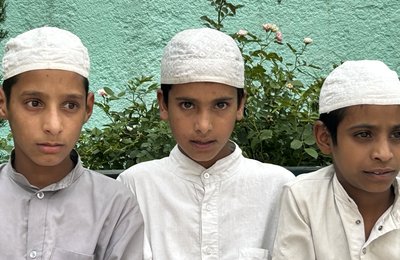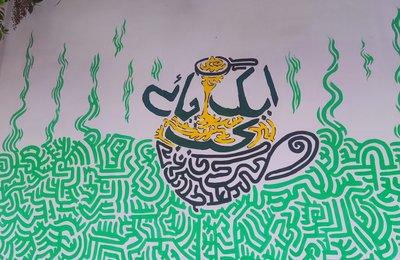
One of such organisations is the Tbilisi-based Studio Re, an active campaigner in rebuilding the broken bridges between the Georgian and Ossetian and Georgian and Abkhaz societies. Since its establishment in 1992 as a creative media company, the studio has authored a number of documentary films on conflicts and their consequences, and, importantly, has done this in partnership with their colleagues from Abkhazia and South Ossetia.
https://www.youtube.com/watch?v=w_OF77OhTas
The earliest of Studio Re productions, The Bridge (in Georgian and Russian) dates back to 1995, just two years after the end of military hostilities in Abkhazia. The film takes place on the Enguri Bridge, the only official crossing point between Abkhazia’s predominantly ethnic Georgian-populated Gali district and its adjoining Zugdidi district of Samegrelo region. The film features the journeys of ethnic Georgians across the Enguri Bridge, an important lifeline for the small batch of ethnic Georgians who had sporadically returned to their homes after the war but faced a fragile political, economic and security situation.
https://www.youtube.com/watch?t=2&v=feotnT49Z9c
The Warmth of Homeland (in Georgian and Russian), a collaborative work of Georgian and Ossetian filmmakers shot in 1998 with the support of the Norwegian Refugee Council. The documentary takes place in the villages of South Ossetia and features the return of ethnic Georgians in separatist-controlled areas and ethnic Ossetians in Georgian-controlled areas of South Ossetia. The images of UNHCR and NRC-facilitated house repairs and the interviews with returnees leave a very optimistic picture of the overall process; having been forced out of their homes for years, the respondents are eager to return to their abandoned houses and start building their lives anew.
https://www.youtube.com/watch?v=iwYZyYrBNB0
Hoping for Peace (in Russian with English subtitles), the first joint product of Georgian and Abkhaz journalists in the aftermath of the conflict in early 1990s, tells the stories of ethnic Georgian IDPs who risked their lives to return to their homes in the Gali District of Abkhazia. Filmed in 2002 with the financial support of Conciliation Resources, the documentary portrays the stories of persons from all walks of life; teachers, musicians, farmers, doctors, who found themselves in times of uncertainly but remain hopeful for the future.
https://www.youtube.com/watch?v=mA9V29EKEtU
The two other joint productions of Georgian and Abkhaz journalists, Northern Ireland (in English) and Karabakh (in Russian with English subtitles) were recorded in 2003 and 2004 respectively. In an attempt to achieve balanced coverage of conflicts, Georgian and Abkhaz reporters travel to Northern Ireland to explore the conflict settlement process and then embark upon a journey in and around Karabakh, another unresolved conflict of South Caucasus. In Northern Ireland the reporters review the history of conflict between Catholics and Protestants with a particular emphasis on the conflict resolution mechanisms.
https://www.youtube.com/watch?v=_tK3qACn_Uo
The documentary film on Karabakh highlights the problems facing residents of the area as well as those displaced from the region in inner regions of Armenia and Azerbaijan. The journalists are interested in what ordinary people think about the return of their former neighbours and cautiously conclude that their views of conflict resolution diverge significantly, making the reconciliation an almost impossible effort.
https://www.youtube.com/watch?v=e3xPhpSQ6hE
Abkhazia: One Side of the Conflict and Ten Years and Still Waiting (in Russian with English subtitles) another collaborative work of Georgian and Abkhaz journalists shot in 2004 with the support of Conciliation Resources. The first of the films tells the story of a journalist from Tbilisi who travels to Abkhazia to find what the region’s residents think of the return of ethnic Georgians eleven years after the end of war. The journalist travels across Abkhazia to collect the views of ordinary people, including a few Georgians who have remained in their homes even after the conflict.
https://www.youtube.com/watch?v=VfvfnHbpJbA
The second film features the return visit of a journalist from Sukhumi, who travels through the cities of Zugdidi, Kutaisi and Tbilisi in Georgia and films respondents who were forced to abandon their homes as a result of the conflict. The two films convey the fears and concerns of the two sides as well as their attitudes and aspirations, and by that, attempt to break the stereotypes endemic in both societies.
https://www.youtube.com/watch?v=85Apf9ulZ98
Dignity Tested by War (in Russian) focuses on the conflict in Abkhazia and was produced in 2006 with the support of the Embassy of Canada. The documentary features 3 Georgians who tell some of the personal stories that they have gone through together with their Abkhaz friends and colleagues. The film reminds the viewers of the friendly relationships between ethnic Georgians and ethnic Abkhazians before, during and after the war.
https://www.youtube.com/watch?v=WAYAK-ALjGw
Absence of Will (in Georgian with English subtitles) was recorded in 2008 and features the story of 2 young Georgian university graduates – Teo and Vakho - who are trying to find the out truth about the conflict in Abkhazia. In search of answers about a war that occurred early in their childhood, the youngsters attempt to construct the reasons of hostilities through gathering recollections of those directly involved in the conflict - politicians, combatants and locals from Abkhazia. While shooting the film, war broke out between Georgia and Russia, and what seemed so distant for their memories, unfolded before their eyes. Now the task becomes harder; instead of looking at the conflicts solely from a historical perspective, Teo and Vakho have to find the truth about a war of their own generation as well.
https://www.youtube.com/watch?v=SrxvT7K0FWQ
The Verdict of the August War (in English) is the most recent documentary of Studio Re (2012). The film attempts to look at the conflicts in Georgia from a historical perspective and engages all sides into the discussion of future prospects of conflict settlement. Perhaps the most important aspect about the film is that it presents the views of governmental officials, experts, journalists and civil society activists from all sides and by that, creates a very rare platform for dialogue on conflict settlement.








